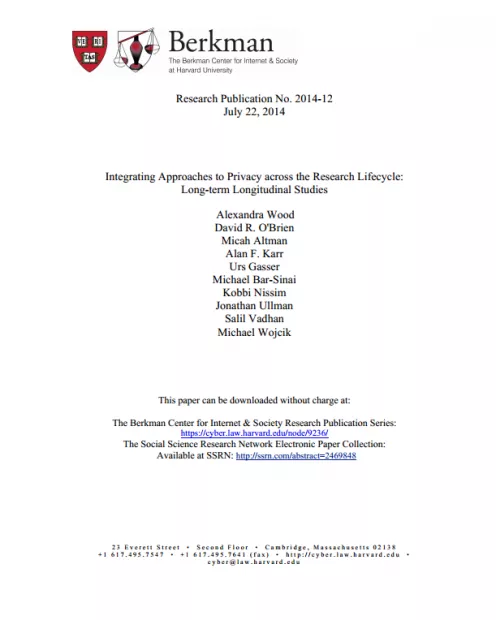
Integrating Approaches to Privacy across the Research Lifecycle: Long-term Longitudinal Studies
Written by Alexandra Wood and David O’Brien, with Micah Altman, Alan F. Karr, Urs Gasser, Michael Bar-Sinai, Kobbi Nissim, Jonathan Ullman, Salil Vadhan, and Michael Wojcik, this paper explores interdisciplinary approaches to privacy in long-term longitudinal studies of human subjects. Long-term longitudinal studies collect, at multiple points over a long period of time, highly-specific and often sensitive data describing the health, socioeconomic, or behavioral characteristics of human subjects. The value of such studies lies in part in their ability to link a set of behaviors and changes to each individual, but these factors tend to make the combination of observable characteristics associated with each subject unique and potentially identifiable.
Using the research information lifecycle as a framework, the paper discusses the defining features of long-term longitudinal studies and the associated challenges for researchers tasked with collecting and analyzing such data while protecting the privacy of human subjects. It also describes the disclosure risks and common legal and technical approaches currently used to manage confidentiality in longitudinal data. Finally, it identifies urgent problems and areas for future research to advance the integration of various methods for preserving confidentiality in research data.
The paper is the first in a series of reports based on the “Integrating Approaches to Privacy across the Research Lifecycle” workshop, held by the Privacy Tools for Sharing Research Data project on September 24-25, 2013. The workshop convened over forty leading experts in computer science, statistics, law, policy, and social science research to discuss the state of the art in data privacy research. The resulting conversations centered on the emerging tools and approaches from the participants’ various disciplines and how they should be integrated in the context of real-world use cases that involve the management of confidential research data. Additional reports are forthcoming in 2014.
This material is based upon work supported by the National Science Foundation under Grant No. CNS-1237235. Any opinions, findings, and conclusions or recommendations expressed in this material are those of the author(s) and do not necessarily reflect the views of the National Science Foundation.
About the Privacy Tools for Sharing Research Data Project
Funded by the National Science Foundation, the Privacy Tools for Sharing Research Data project is a collaboration between the Berkman Center for Internet & Society, the Center for Research on Computation and Society (CRCS), the Institute for Quantitative Social Science, and the Data Privacy Lab that seeks to develop methods, tools, and policies to facilitate the sharing of data while preserving individual privacy and utility.
Executive Director and Harvard Law School Professor of Practice Urs Gasser leads the Berkman Center's role in this exciting initiative, which brings the Center's institutional knowledge and practical experience to help tackle the legal and policy-based issues in the larger project.
More information about the project is available on the Berkman Center’s website and the official project website.



